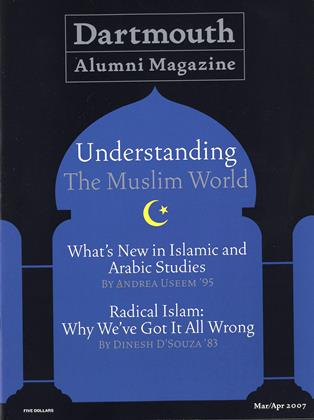"STORMY" MAYO HI '85 marks30 years rescuing marine life.
At the 30th anniversary celebration for the Provincetown (Massachusetts) Center for Coastal Studies (PCCS) last August, senior scientist Mayo recounted the humble beginnings of the center he co-founded in 1976 with his late wife, Barbara Mayo, and Graham Giese. "We held coastal ecology classes on the beach, and when it rained I took everyone into my living room and wrote on the walls in chalk," Mayo told more than 100 PCCS supporters who gathered in the center's new 11,300square-foot marine laboratory.
Since then the center has grown into an internationally known marine lab, conducting marine education through its Mass Sail program and performing critical research on humpback whales and the endangered North Atlantic right whale, which Mayo oversees as director of right whale habitat studies. Fewer than 350 right whales remain, and Mayo's team's findings led the federal government to designate Cape Cod Bay a critical habitat in 1994.
Mayo and the center are best known, however, for rescuing whales entangled in commercial fishing nets and gear. They successfully disentangled their first whale in November 1984, using the old whaling technique of "kegging" as suggested by Mayo's late father, renowned sportfisherman Charles Mayo Jr. '32. By attaching floats to tire the whale (as whalers once did with wooden kegs), Mayo was then able to remove the nets with a grappling hook and knife.
"Even as many times as I've done this, of course it's still frightening," says Mayo, who motors alongside the 100-ton whales in a small, inflatable boat, wearing only a lacrosse helmet for protection. "They're still dangerous animals but we now have a relatively effective technique for free-swimming humpbacks, minke whales and fin whales. The problem is that the right whale is the most difficult animal to deal with in terms of disentanglement. We only succeed in about half the right whale entanglements."
Until 2005 Mayo had to be present at every rescue because of his expertise. But with a trained team in place, "I can now get out of the bow of the boat," says Mayo, "which my sons [Josiah and Nathaniel] have asked me to do for about five years."
 View Full Issue
View Full Issue
More From This Issue
-
 Feature
FeatureA Conversation With Jim Wright
March | April 2007 By Jake Tapper ’91 -
 Feature
FeatureRadical Islam
March | April 2007 By DINESH D’SOUZA ’83 -
 Cover Story
Cover StoryA Better Understanding
March | April 2007 By ANDREA USEEM ’95 -
 Feature
FeatureNotebook
March | April 2007 -
 Feature
FeatureAlumni News
March | April 2007 By Scott Listfield '98, Scott Listfield '98 -
 TRADITIONS
TRADITIONSBook of Mystery
March | April 2007 By Julian Kesner ’00
Bonnie Barber
-
 Article
ArticleNewsmakers
May/June 2007 By BONNIE BARBER -
 Article
ArticleThe Water Boy
Sept/Oct 2007 By Bonnie Barber -
 Article
ArticleNewsmakers
July/August 2008 By BONNIE BARBER -
 Article
ArticleNewsmakers
May/June 2011 By BONNIE BARBER -
 Article
ArticleNewsmakers
Nov/Dec 2011 By BONNIE BARBER -
 Article
ArticleNewsmakers
Mar/Apr 2013 By BONNIE BARBER







